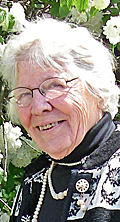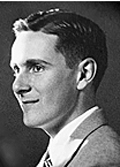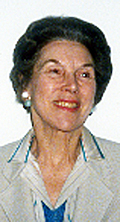
|
|
Vol. LXII, No. 41
|
|
Wednesday, October 8, 2008
|

|
|
Vol. LXII, No. 41
|
|
Wednesday, October 8, 2008
|

Dora Cecile Seyfarth Verbeyst, 85, of Mount Rose in Hopewell Township died September 27 at home surrounded by her family. Born in the Princeton Hospital, she was the daughter of Mathilde Rousseau Seyfarth and Jacob Seyfarth. Married for 59 years to the late Louis Verbeyst, she and her husband owned and operated Verbeyst French Dry Cleaners in Princeton.
A graduate of Somerville High School and Bucknell University, she was a past member of both the League of Women Voters and the American Association of University Women. She was an active member of the Blawenburg Reformed Church and served with her husband as charter members of the Montgomery Township Volunteer Fire Department No. 2 in Blawenburg.
As an avid collector of antiques with an interest in the preservation of the environment, she spent many happy times at their second home, a farm located near Canton, Pennsylvania. Her love of children inspired her, along with a small group of women, to bring about the regionalization of all the schools within Hopewell Township, creating the Hopewell Valley Regional School System.
Predeceased by her husband, Louis Verbeyst and grandson, Louis (Luke) Verbeyst, she is survived by six daughters: Barbara Blackwell of Roaring Branch, Pa., Frances Rainsford of Hyde Park, N.Y., Janet Melamed of Phoenix, Arizona, Alice Hersh and Ginger Leonard, both of Hopewell Township, Margaret Gorman of Manassas, Va.; one son, Kenneth Verbeyst, of Princeton; 19 grandchildren and seven great grandchildren.
A memorial service was held Sunday, September 28, at the Blawenburg Reformed Church in Blawenburg. In lieu of flowers, contributions may be made to the Blawenburg Reformed Church or the Montgomery Township Volunteer Fire Department No. 2., located in Blawenburg, NJ, 08504

John Erdmann Kuser, 82, a resident of Princeton, died Monday, August 25 surrounded by his family.
Born in New York City to John Louis Kuser, Jr., and Olivia Sturdevant Erdmann, he was raised in Bordentown and Titusville, New Jersey. Preparing at The Millbrook School, he entered Princeton University at age 16, interrupting his studies to serve in World War ll as Lieutenant JG in the US Navy, where he served in the Mediterranean and Caribbean as a landing boat officer. After the war he returned to Princeton, graduating magna cum laude in chemistry with the Class of ’46. Following graduation he worked for 23 years in the chemical industry for Interchemical Corporation and Tenneco. In 1971 he decided to pursue his avocation, forestry, and enrolled at Cook College, Rutgers, receiving his Masters degree in 1976 in Horticulture and Forestry. He earned his Ph.D. from Oregon State University in 1980 in Forest Science. Returning to New Jersey, he began to teach at Cook College, Rutgers, retiring as an Associate Professor of Forestry in 2001.
Mr. Kuser was a member of the New Jersey Academy of Science, Sigma XI (a scientific research society of North America); the Society of American Foresters; and the International Society of Arboriculture. He published numerous articles on forest genetics throughout his teaching career. In 2000, he compiled and edited the Handbook of Urban and Community Forestry in the Northeast, which has become the standard text for teaching urban forestry.
Mr. Kuser served as Chairman of the Board of Trustees of the Stonybrook-Millstone Watershed Association; was a member of the Princeton Township shade tree commission; a member of the Princeton Township deer committee, serving on the Mayor’s ad hoc committee and then Chairman of the deer committee environmental commission. He was a director of New Jersey Forestry Association; was a member of the Forestry Advisary Committee- Pinelands Commission; a member of NJ DEP Community Forestry; and was appointed to the NJ Fish and Game Council by Governor Whitman.
He was a gardener, fly fisherman, and hunter. For him, the outdoors represented the greatest mystery and he took solace from it all his life.
He lived with a rare neurological disease for the last five years of his life. As his last act as a scientist he agreed to have his brain autopsied to further research this disease.
He was predeceased by his wife of 55 years, Eleanor Will Kuser, and is survived by his three daughters: Olivia, of San Francisco; Caryl of Princeton; and Eleanor of Santa Barbara; and one grandson, Emilio, also of Santa Barbara.
Burial is private.
Donations may be sent in his name to Morris Arboretum, 100 East Northwestern Avenue, Philadelphia, PA, 19118.

Anne Ramsay Somers, Adjunct Professor of Medicine, Geriatric Division, University of Pennsylvania and Adjunct Professor, Department of Environmental and Community Medicine, University of Medicine and Dentistry of New Jersey and the Robert Wood Johnson Medical School, died September 24 at Pennswood Village, Newtown, Pa. She was 95 years old.
Author, lecturer, professor and health care expert, she has been engaged for over five decades, in health economics and the delivery of medicine focusing on long term care, health promotion, consumer health education, and geriatric medicine. According to Dean of Woodrow Wilson School Anne-Marie Slaughter, “Anne Somers was a feminist pioneer before anyone even coined the term. She was a role model and an inspiration to countless women, young and old.”
Born in Memphis Tennessee, she earned her bachelor’s degree in history at Vassar College and continued studies in economics at the University of North Carolina. From 1936-1943 she was Education Director for the International Ladies Garment Workers Union, and from 1943-1946, labor economist at the US Department of Labor.
She married Herman “Red” Somers in 1946 and moved to Haverford, Pa. At her husband’s suggestion, she wrote a chapter on workmen’s compensation for a book he was writing on Social Security. Instead of going into the book, the chapter became the starting point for research on their first collaborative work Workman’s Compensation: Prevention, Insurance and Rehabilitation of Occupational Disability, published in 1954.
An article that the couple wrote for The California Law Review became the basis for their book: Doctors, Patients and Healthcare Insurance: The Organization and Financing of Medical Care, which was published in 1961. The book defined the field of healthcare economics for the next 20 years and won the 1962 Elizur Wright Award presented by the American Risk and Insurance Association for outstanding contributions to the literature of insurance. In 1965, she assisted her husband with his contributions to the Medicare Bill under Wilbur Cohen.
In 1970, the Somers were on the Health Insurance Benefit Advisory Council, which advised HHS on Medicare reimbursement. During that time, she became interested in health promotion, disease prevention and long-term care. In 1975, she was asked to head a task force on Health promotion at the National Conference on Preventive Medicine sponsored by the American College of Preventive Medicine and the National Institutes of Health. This heightened awareness of the medical and financial benefits of disease prevention led directly to the creation of the Office of Disease Prevention and Health Promotion, a division of the National Institute of Medicine. She co-authored numerous articles at this time, many of which were published in The New England Journal of Medicine.
After her husband suffered a serious stroke in 1979, her interests turned to geriatrics and long-term care. In her role as adjunct professor at the two schools of medicine, she developed long-term-care curricula and programs, such as a student elective in geriatric medicine and an annual faculty seminar on geriatrics. She was senior editor of The Geriatric Imperative: an Introduction to Gerontology and Clinical Geriatrics.
In September 1992, she was selected by the journal Modern Healthcare to join 28 other leaders of the American hospital and health care industry in the Health Care Hall of Fame. In April 1994, she received the Zubrow Award for Humanism in Medicine, bestowed by Pennsylvania Hospital, Philadelphia. In April 1996, she received the first Charles H. Mann MD Award presented by the National Council on the Aging and the Mann Family Charitable Foundation “for her exemplary dedication to care giving and her contributions to our understanding of those in need.”
She has been an honorary member of the Society of Teachers of Family Medicine since its founding. In 1978, she received the Distinguished Career Award from the American Public Health Association Public Health Education Section. In 1981, she and her husband shared the New Jersey Hospital Association’s Annual Achievement Award and in 1983 they received the Annual Citizen’s Award from the Academy of Medicine of New Jersey. In October 1984, they were honored by UMDNJ and Rutgers University with a special symposium “Exploring New Frontiers of U.S. Health Policy.”
She was a member of the National Academy of Social Insurance and a senior member of the National Academy of Sciences-Institute of Medicine.
She is survived by her daughters, Sara Somers of Oakland, Ca., Margaret Somers of Ann Arbor, Michigan. and two nieces: Ellen Ramsay Clark of Memphis, Tenn. and Susan Ramsay Whitehead of Jackson, Tenn.
A memorial service will be held at Pennswood Village, Newtown, Pa. on October 18 at 10 a.m. Memorial contributions may be sent to the Pennswood Village Entry Fee Assistance Fund, Pennswood Village, Route 413, Newtown, N.J. 18940, or the Herman M. “Red” Somers Memorial Lecture Series at the Woodrow Wilson School of Public & International Affairs, Princeton University, 424 Robertson Hall, Princeton, N.J. 08544.

Doris Shapiro, 82, an unschooled philosopher who loved Motown music and the ocean, died October 1 at the Heartland Nursing Home in Lauderhill, Florida.
Known for her offbeat sense of humor, colorful style and generosity, the longtime Princeton resident cultivated many devoted friends of all ages.
Born Doris Mae Seidemann in Pittsburgh, she moved with her family to the Jersey Shore when she was very young. As a child, she read for hours on the jetties of Margate City and Ventnor. She also boasted of hearing Frank Sinatra sing on the Steel Pier in Atlantic City.
Growing up during Atlantic City’s heyday as a resort town, she remained under the spell of its snazzy nightclubs, grand hotels and boardwalk hokum throughout her life. She was particularly fond of Lucy the Elephant, a work of architectural whimsy built in 1881 south of Atlantic City. The six-story structure is now a National Historic Landmark.
In 1964, she would return to Atlantic City with her husband for the Democratic National Convention where she socialized with the Duke and Duchess of Windsor. It was a triumph for someone from a poor background who had not finished high school.
At 16, she left home to make a living in Washington, D.C. During World War II, she worked at the Government Printing Office. She told her children that she had a sweetheart who died in the war.
Later, she moved to New Brunswick, where she took a job as a switchboard operator at the Daily Home News. She also wrote a help column called “Doris the Answer Girl.” At the paper, she met her future husband, Lester Shapiro, a sports and political reporter. In 1952, the two wed in secret and later celebrated their marriage in a Jewish ceremony.
Together, the couple felled trees and cleared the land for a single-story home in Rutgers Heights, N.J. where they raised three children. For good luck, Shapiro gilded and hung a horseshoe unearthed from the property over a door in the new home.
She decorated the living room in an orange palette she described as “Early Halloween.” An avid gardener, she also filled her suburban backyard with iris, day lilies and dozens of perennials.
The family moved to Princeton in 1964 where Doris Shapiro continued to struggle with an undiagnosed mood disorder, swinging between high spirits and depression never adequately treated.
That did not stop friends drawn to her native intelligence and sardonic worldview. Nor did illness prevent her from earning a GED in the mid 1970s.
For a brief period in the late 1970s, she also operated an antiques shop in Jobstown, N.J. chockablock with finds from flea markets and attics. In 1987, she moved to Pembroke Pines, Fl.
She is survived by children Stephanie Shapiro of Baltimore, Md., Roberta Shapiro of Pawtucket, R.I., Paul Shapiro of Geneva, Switzerland, and five grandchildren. Her marriage ended in divorce.
A memorial service will be held at 3 p.m. on Saturday, November 22, at the Nassau Inn.
Stephen Rawlyk, 79, of Pittstown, NJ, lost his battle with cancer on Tuesday, September 30, and died peacefully at his home surrounded by his family.
Born October 22, 1928, to the late William and Vera (Lisowy) Rawlyk, he died on the family farm in the same house in which he was born under the excellent care of his family and the Hospice service.
His parents came to America from the Ukraine after World War I. His father William and mother Vera worked in New York City for several years before purchasing a 118-acre farm in Kingwood Township in the 1920s. His father, formerly a chef at a large restaurant in New York, worked on improving the farm for several years but died at the age of 39 when Stephen was only four years old.
After losing his father at that young age, he devoted his whole life to the farm and his family, working side by side with his mother for many years operating a thriving poultry and egg production business. To attend school, he walked about one mile from his home to the Oak Summit one-room school each day. He was a 1947 graduate of Frenchtown High School.
He developed a love for flying and at the age of 16, he got his pilotís license. While still in high school, he bought his own plane, a Piper Cub and then a Fairchild PT 19 which he flew from a homemade airstrip on the farm. He enjoyed flying aerobatics with several local friends who also had airplanes. He attended college at Spartan School of Aeronautics in Tulsa Oklahoma graduating with a degree in Airport Management.
Despite his love of aviation, he elected to come back home to raise a family and further expand the farm business. In 1949 at the age of 19, he married Edith Thorpe of Milford, N.J., and they came back to live on the farm. In 1956 his son William was born, followed by his daughter Brenda in 1959. By the late 1950’s the farm had over 30,000 chickens producing over 4 million eggs a year (he even had an egg route in New York City) while the farm yielded nearly 100 acres of corn. After 1980, he switched the agricultural operation to sod farming and operated the farm in commercial sod production until 2006 as “Hunterdon Turf Farm.”
He enjoyed life, loved the land, and “The Farm” was in his blood, and was also active in local and county politics. In 2006 he sold and permanently preserved 60 acres of the fourth generation family farm to the State of New Jersey as part of the Lockatong Creek Wildlife Management Area, a public nature preserve. The sod fields were converted to native grasses and constructed wetlands and trails that were created for the benefit of all. The nature preserve, located on Hampton Road is managed by D&R Greenway Land Trust and is open to the public in daylight hours. His son, William, is D&R’s director of Land Acquisition.
Stephen is survived by his wife, Edith (Thorpe) Rawlyk of 59 years of Kingwood, his son, William C. Rawlyk of Kingwood Township, his daughter Brenda Wagner of Frenchtown, and his two grandchildren.
Funeral services were held on Saturday at the Johnson-Walton Funeral Home. Interment was at Frenchtown Cemetery.
Memorial contributions may be made to Midland School for Special Needs, PO Box 5026, North Branch, N.J. 08876 or D&R Greenway Land Trust 1 Preservation Place Princeton, N.J. 08540.